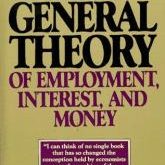Lo Stato di Malta è responsabile dell’assassinio di Caruana Galizia .[embedded content]
Read More »Klasskämpen
Detta är Kafé Frankfurt. Långt nere i denna ölhall sitter en gammal man i vit skärmmössa och slokande grågul cajandermustasch. Han är manen som jag älskar mest av alla mänskor. Han är min hemkomst. Om du vet varifrån du kommer, finns det faktiskt inga gränser för hur långt du kan gå. Det är ett ord av morfar. Det är ett ord som jag ibland håller i handen som en glatt sten eller ett stycke gammalt trä. Om du vet riktigt säkert varifrån du kommer. Om du vet det och orkar med att...
Read More »Why MMT rejects the loanable funds theory
Why MMT rejects the loanable funds theory Government deficits always lead to a dollar-for-dollar increase in the supply of net financial assets held in the nongovernment bucket. That’s not a theory. That’s not an opinion. It’s just the cold hard reality of stock-flow consistent accounting. So fiscal deficits — even with government borrowing — can’t leave behind a smaller supply of dollar savings. And if that can’t happen, then a shrinking pool of dollar...
Read More »Your time is limited, so don’t waste it!
Your time is limited, so don’t waste it! .[embedded content] This one is for my sons and daughters. Never give in. Never give up.
Read More »My friends — you bow to no one!
My friends — you bow to no one! Edward Snowden and Daniel Ellsberg. Bravest of the brave. [embedded content]
Read More »Microfoundational incoherence
Defenders of microfoundations and its rational expectations equipped representative agent’s intertemporal optimization often argue as if sticking with simple representative agent macroeconomic models doesn’t impart a bias to the analysis. Yours truly unequivocally rejects that unsubstantiated view, and has given the reasons why here. These defenders often also maintain that there are no methodologically coherent alternatives to microfoundations modeling. That allegation is of...
Read More »Cherry-picking economic models
How would you react if a renowned physicist, say, Richard Feynman, was telling you that sometimes force is proportional to acceleration and at other times it is proportional to acceleration squared? I guess you would be unimpressed. But actually, what most mainstream economists do amounts to the same strange thing when it comes to theory development and model modification. In Dani Rodrik’s Economics Rules — just to take one illustrative example — the proliferation of economic...
Read More »It’s not the debt we need to fix, stupid! It’s our thinking.
It’s not the debt we need to fix, stupid! It’s our thinking. The ad nauseam repeated claim that our public debt is excessive and that we have to balance the public budget is nothing but absolute nonsense. The harder politicians — usually on the advice of mainstream establishment economists — try to achieve balanced budgets for the public sector, the less likely they are to succeed in their endeavour. And the more the citizens have to pay for the concomitant...
Read More »The real crises we are facing
The real crises we are facing The fact that 21 percent of all children in the United States live in poverty—that’s a crisis. The fact that our infrastructure is graded at a D+ is a crisis. The fact that inequality today stands at levels last seen during America’s Gilded Age is a crisis. The fact that the typical American worker has seen virtually no real wage growth since the 1970s is a crisis. The fact that forty-four million Americans are saddled with...
Read More »July 22, 2011 — a date which will live in infamy
July 22, 2011 — a date which will live in infamy .[embedded content] .[embedded content]
Read More » Lars P. Syll
Lars P. Syll






